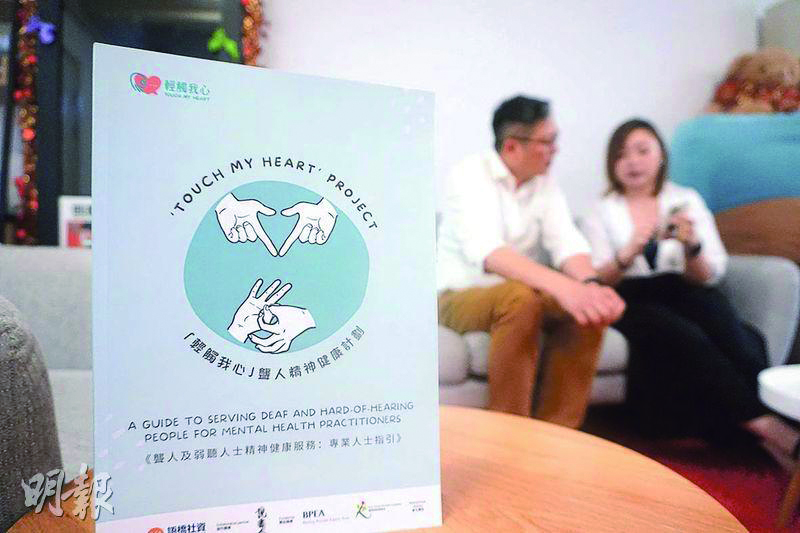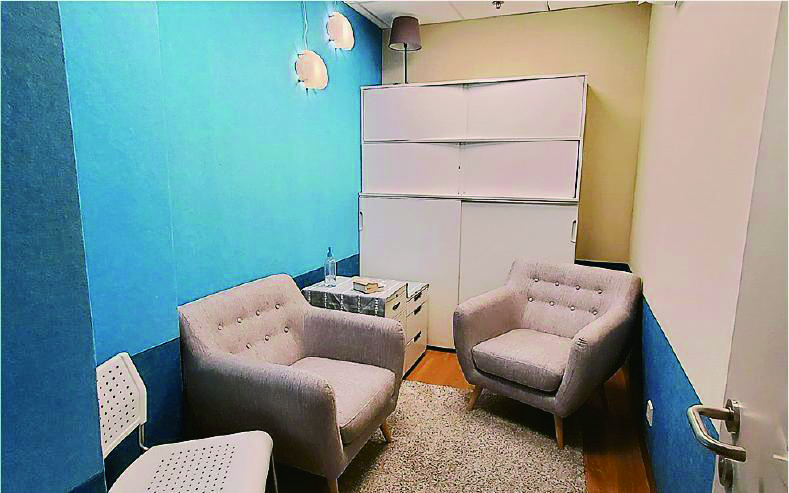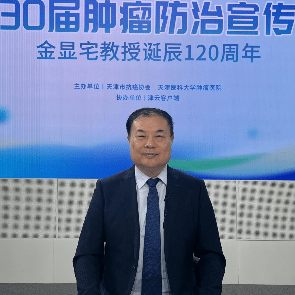[Mental Health]Tripartite counseling by psychologist + sign language interpreter opens a door to the heart of the deaf
[ad_1]
Text◆Zhu Lingjun “Ming Pao”
In Hong Kong, deaf people have difficulty accessing appropriate mental health services due to various reasons. The distance between them and service providers is not only a language barrier, but also hearing people’s lack of understanding of deaf culture, and deaf people’s lack of mental health information.
In the past two years, two social enterprises, Language Bridge Social Capital and Storytellers, have worked together to try to establish a model that allows psychologists, sign language interpreters and deaf people to work together on an equal footing to promote the mental health of deaf people.
background
Project: Developing a “Sign Language Bilingual Mental Health Service Model”
Purpose: To provide deaf people with appropriate mental health services
Characters: Yuqiao Social Capital, “storyteller” clinical psychologist, sign language interpreter, deaf person
(Hong Kong News) Social enterprise Yuqiao Social Capital has been providing education and training for deaf children. Director and founder Yao Qinmin (Chris) noticed that deaf people feel discouraged living in a society dominated by hearing people.
“It’s as simple as our students graduating from middle school and entering university without sign language interpretation. They have to face the frustration of not knowing what the teacher says every day.” Some deaf people have weak oral communication skills, which further affects social interaction. Deaf people of different ages accumulate negative emotions. “Sometimes I talk to colleagues and teachers about how we can help them? That’s a big problem.”
Organizations that provide mental health services may not necessarily have sign language interpretation services, and even if they do, the quality of interpretation cannot be guaranteed. “When they go out to receive psychological counseling services, if there are some institutional challenges that cause them more frustration, we definitely don’t want to see this happen.”
Written communication is difficult to replace sign language
Nowadays, people who are deaf or hard of hearing can seek mental health services in the public and private markets. You may ask, can’t written communication replace sign language interpretation? Joyce, a deaf person, heard some deaf friends share their experience of using pen and paper to communicate during follow-up consultations at the Psychiatric Department of the Hospital Authority. However, consultation time is already limited, and it is actually very troublesome to go back and forth with the doctor. In addition, not all deaf people have high language skills, and they may be more accustomed to communicating in sign language. Currently, HA patients and medical staff can arrange interpretation services through relevant hospitals or clinics, but interpreters may not necessarily have received mental health training.
As for counseling and psychotherapy services in the private market, there is even a lack of sign language interpretation facilities, and deaf people are easily turned away when seeking help.
In order to fill the service gap, Yuqiao Social Capital will launch the “Touch My Heart” mental health plan for the deaf in 2021, and collaborate with “Storytellers”, a social enterprise that promotes mental health, across professions to develop a “sign language bilingual mental health service model.” In the past two years, this project has provided clinical psychological assessment and treatment services to deaf or hard-of-hearing people and their family members. The participating clinical psychologists and sign language interpreters have received relevant training.
Whether it is training or practice, Hong Kong has no precedent to follow and relies on the expertise of the three parties to learn from experience. Language bridge social capital and storytellers lead the participation of sign language interpreters and clinical psychologists respectively. What other professions are there besides this?
Yao Qinmin said that it was the deaf people themselves who gave their opinions on the culture of the deaf and the use of sign language. Clinical psychologist Zeng Shanyu (Ella) added, “We often say that it is an inter-professional collaboration. It is not purely about what psychologists want to do, nor is it purely about sign language interpreters telling deaf people what this is like, but how everyone starts. The three professional levels complement each other.” There is no distinction between the three majors, and they learn from each other in the process.
Sign language interpreters: must master professional vocabulary

The “Touch My Heart” project has developed Hong Kong’s first mental health sign language interpretation training course. 13 interpreters have completed the training, including the deaf person Pan Songshi mentioned above, and the hearing sign language interpreter Wan Kejing (Heidi) .
Wan Kejing once studied for a professional diploma in sign language interpretation, covering different environments such as education, medical and legal. She found that compared with other scenarios, interpreting for psychological counseling services has its own unique features. The first thing is to master how to interpret professional words that are not often encountered. “I usually know how to say ‘unhappy’ when I am suffering from depression; I can’t imagine what can be done.” Pan Songshi added that expressions are also very important. For example, “depression” and “unhappiness” share the same sign language. In order for deaf people to understand the difference between the two, the former must appear more serious or frown more deeply. . In addition, many deaf people lack understanding of mental illness.
Pan Songshi said that literal translation of the name of the disease alone is not ideal. “If the sign language of obsessive-compulsive disorder is spelled with “force” and then “disease”, the deaf person may think that he is being forced to do something. (So) the meaning of obsessive-compulsive disorder must be explained clearly. , it may be paying attention to cleanliness, washing hands multiple times a day, etc.”
In addition to learning sign language with different vocabulary, interpreters must also understand the ethical codes they must abide by when participating in mental health services, such as the confidentiality of interviews. This is both critical and challenging for interpreters because the small number of interpreters makes it easy for them to encounter deaf people receiving services in other settings.
Dual relationships are not conducive to therapy
In order to prevent others from knowing that the deaf person receives mental health services, clinical psychologist Zeng Shanyu pointed out that the interpreter should not take the initiative to greet the service user after leaving the interview room, which is consistent with the usual practice of psychologists. Pan Songshi has indeed encountered this situation, “I have seen deaf people say ‘hi’ to me directly, so I have to explain clearly that there is a difference between my current status and my status at that time (participating in counseling).”
The circle of hearing people is very large, but deaf people may have been friends on social media. “I won’t say (because) I have the status of interpreter and service provider, but after contacting me, I suddenly unfollowed (cancel following) , there will be a little embarrassment, this is the most difficult, it really depends on how to draw your own boundaries.”
One part of the “Sign Language Bilingual Mental Health Service Model” is to match deaf service users with sign language interpreters before services are provided. The consideration is not only the preferred communication method of the deaf person, but also the hope of pairing sign language interpreters who have not met before to minimize the impact of “dual relationships”.
Ella explained that dual relationships will adversely affect the therapeutic effect and increase the risk of privacy leaks. However, because there are so few sign language interpreters, especially those with mental health training, and because it is difficult to completely avoid contact with service users, the model also adds an option: service users and sign language interpreters will be asked if they know each other. Whether they feel uncomfortable with the arrangement, both parties can request to change the arrangement if necessary.
Psychologist: Deaf culture influences expression
Before participating in “Touch My Heart”, Zeng Shanyu admitted that he didn’t know much about the deaf community. “Psychologists rarely have contact with deaf people in their training, so we also spent a lot of time studying, reading some different literature or Foreign guidance, such as what to pay attention to, and actually asking deaf people for advice.”
She slowly realized that sign language interpretation is not just a translation of language. The culture of deaf people will affect sign language expression. Therefore, Hong Kong Sign Language is not the same as Cantonese, but a unique language. “It’s like providing services to people in another country. I don’t just have to have an Italian translator, but I have to understand the unique culture and challenges in their daily lives.”
Therefore, sign language interpretation is like a tour guide, opening the way for psychologists to enter the world of deaf people.
Open-ended questions are more difficult to deal with
Zeng Shanyu later learned that some words did not have corresponding sign languages, so he had to revise the words when asking questions to the deaf. During psychotherapy, people often ask “when” something started or happened. It turns out that deaf culture may not have the same understanding.
Sign language interpreter Wan Kejing pointed out that in sign language, only “what time” and “what day of the month” can be accurately asked, and it is difficult to interpret the meaning of “when”.
Sometimes she consults with a psychologist to see if there are alternatives. Pan Songshi also reminded that open-ended questions are more difficult to deal with, so you should be more direct when asking questions, or provide examples.
Do clinical psychologists need to know sign language if they want to serve deaf people? Zeng Shanyu used travel as a metaphor, “If you are willing to learn a word or two of the other party’s language, the other party will actually feel that you want to know their culture.”
Of course, accurate interpretation must be left to the interpreter. However, if psychologists can learn simple sign language and greet the deaf people, they can make them feel respected.
Deaf people: have misunderstandings and are unwilling to ask for help
Even if needed mental health services exist, it doesn’t help if deaf people are unwilling to seek help. In the early days of “Touch My Heart”, Yao Qinmin noticed a helpless situation, “Our service is free, and clinical psychologists help. If you come forward, there will be a long queue, but at first there were not many deaf people participating. Service. Ask those deaf people, they said sometimes they have misunderstandings and are very worried. Maybe they think that seeing a psychologist means I am ‘crazy’?”
Pan Songshi also felt that the deaf community has many misunderstandings and stigmas about mental illness. Simple sign language such as “psychiatric” is the same as “psychiatric” sign language, which makes some deaf people not like to seek treatment in hospitals. It can be seen that society still needs more mental health education for deaf people.


Promoting “Touch My Heart”, more and more deaf people seek help
Ella pointed out that when doing psychotherapy with deaf people, special time is spent explaining their rights to them, not because they have weak understanding, but because society rarely provides relevant information.

“We found that many deaf people may think that professionals are very intimidating (intimidating), as if they have to do whatever I say or ask. But in fact, our relationship is equal, and these things need to be explained clearly. .”
A friend who is deaf once learned that Pan Songshi participated in the “Touch My Heart” program and asked her if she would see the information on the counseling cases, “I also said ‘no, no’. You need to explain it clearly to make them feel at ease. They feel at ease.” Only then are they willing to seek help.”
Pan Songshi said that as the program progresses, more and more deaf people are willing to seek help and are aware of their mental health needs. As the two-year project comes to an end, Yuqiao Social Capital and Storytellers have summarized their experience and released “Mental Health Services for Deaf and Hard of Hearing People: A Guide for Professionals” earlier.
Panxun Resource Extension Plan
Yao Qinmin hopes to find resources in the future to continue the “Touch My Heart” program, and is also considering developing paid professional training to subsidize program expenses. Of course, a single plan cannot cope with the service volume for all deaf people in Hong Kong. Therefore, he hopes that the government and other service organizations can refer to the “Guidelines” and go one step further for the mental health of deaf people. “Sometimes we often calculate resources and (feel) there are few deaf people, and so many resources can help so few people. But I often feel that resources are not only to help deaf people. If it is a responsible government or institution, we There should be a real acceptance of people with disabilities.”
With the right package, he believes professionals can provide services no matter who comes in front of them. “At least in the future, when a psychologist encounters a deaf client, he will tell his boss: ‘I would like a professional sign language interpreter to help me with this case. Can you allocate some resources?’ instead of saying: ‘We don’t have one. Sign language interpretation may not help him.'”
“Touch My Heart” Project
The project provides online resources, including online psychological assessment in both Chinese and Hong Kong Sign Language.
Website: touchmyheart.slco.org.hk/
[ad_2]
Source link

![[Love Wants Sexual Happiness Series 358]Find the culprit and overcome psychogenic erectile dysfunction. Don’t let pressure affect your sexual happiness.](https://chinathenews.com/wp-content/uploads/2024/04/171111-780x420.jpg)

![[Wanqingyi Care]My health, my rights, customized medical methods in the last stage of life](https://chinathenews.com/wp-content/uploads/2024/04/ZZ1-100-780x420.jpg)
![[Kidney Transplantation Special Topic]The survival rate of transplanted kidneys is high without dialysis treatment three times a week](https://chinathenews.com/wp-content/uploads/2024/04/1311-780x420.jpg)



